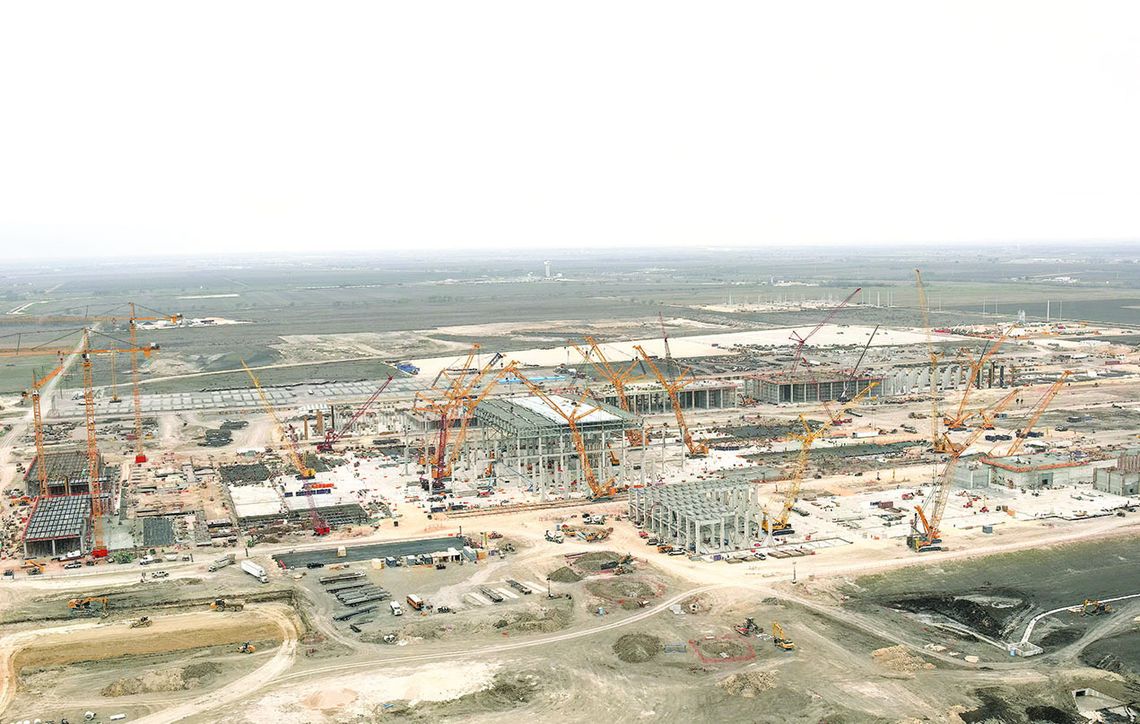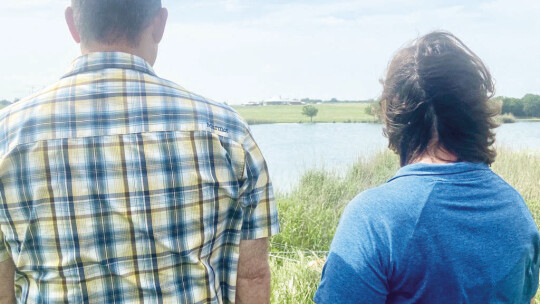A potential new law could give some relief to property owners living in the shadow of Samsung Austin Semiconductor by allowing them to petition Taylor for removal from the city’s extraterritorial jurisdiction.
At issue are complaints from property owners along Windy Ridge Road and other parcels near the South Korean-owned, multibilliondollar plant who say city no-growth restrictions make it difficult or even impossible to sell their land.
Adding to those property owners’ worries are new deals the city is entering with South Korean builders and developers, including Bando
This stinks. The city is trying to play broker and get the deals they want.” “
- Alice Duffy, real estate agent Construction — which erects housing units near Samsung factories.
However, there may be a path forward for landowners who feel slighted, said attorney Chris Johns, who is investigating a possible mass-action lawsuit against the city involving nearly 50 sets of homeowners in the ETJ.
Johns argues the city’s practice of designating areas as no growth and limited growth amounts to “shadow zoning” the ETJ — something it cannot legally do, he maintains. And that is preventing residents from selling their land at fair-market value.
“I don’t like that the city is picking the winners and the losers,” Johns said.
While drawing up the potential lawsuit, he said he also worked with lawmakers to craft state Senate Bill 2038 to offer property owners on the fringes of a city to petition a municipality to be let out of an ETJ.
The bill passed both the Texas House and Senate, and as of May 9 is awaiting Gov. Greg Abbott’s signature. Johns said while it’s a win, the story isn’t over, as would-be developers will still have to apply to Williamson County for utilities.
As you drive up Windy Ridge Road to CR 405, you can’t help but appreciate the view. Corn grows in abundance in one field, horses graze in another and then, sprouting like a new crop, one for-sale sign after another.
As you round a bend, the reasoning behind the mass exodus becomes clear. South Korea’s largest investment in the United States rises out of the once-unbroken farmland like a metal monster, gobbling 1,200 acres (almost 2 square miles) all at once.
John and Renee Kitsmiller are among those Taylor-area residents living in Samsung’s shadow who desire to leave before the plant becomes operational next year.
They bought their 39 acres in 2006 after falling in love with the area and even joked about being buried on the property. They thought about staying, even though they were less than a mile away from the new plant, but as construction began so did their problems.
Renee Kitsmiller said this wasn’t the quiet country life they had planned.
“It was so disruptive, so sudden and no one even asked us if this is what we wanted,” she said.
A year ago, the Kitsmillers put their acreage up for sale but didn’t receive any offers. They say it had everything to do with the city of Taylor designating Windy Ridge a nogrowth zone.
Samsung’s $17 billion fabrication foundry— the largest foreign investment in Texas history — is a permanent part of the Blackland Prairie landscape now, the latest addition to the company’s business venture that started in the 1990s with another plant about 20 miles away in Manor.
Supporters say the Taylor venture promises to bring thousands of jobs to the area, more cultural diversity, grants or other funding to local institutions and beneficial internships.
But critics argue there’s another side to the story.
The Kitsmillers’ home and others in the Windy Ridge area are part of Taylor’s ETJ. This is land outside the city limits where residents don’t enjoy services such as electricity or water. Every city has an ETJ as a way of defining potential growth and boundaries for future services. Taylor drew up its comprehensive plan for the ETJ first in 2021, and then again in 2022 after the Samsung deal was announced in November 2021 because the city said it needed to accommodate Samsung’s needs.
Mayor Brandt Rydell said preserving agriculture land in the Windy Ridge area was key.
“The last thing we want to see in Taylor is a lot of residential development crammed right up against this factory,” he said.
There’s a lot at stake in this game. According to Johns, the city has killed $100 million in land deals by using its comprehensive plan as a guide.
“A developer goes to the city and the city says we can’t offer you utilities in that area for 20 years. Who would stick around?” Johns said.
“This stinks. The city is trying to play broker and get the deals they want,” said Alice Duffy, a real estate agent.
Duffy added she’s seen so many deals fall through in this same way and nothing is selling because of it. While others in and around Taylor are benefiting from increased land values, many in the ETJ are not so lucky. Duffy said by limiting what developers can do with the land, the city is holding down property values.
At the same time, the county is appraising land outside of agriculture prices, so taxes are going up.
“No one is going to pay fair-market value like this,” Duffy said.
The city is considering amending its comprehensive plans on further plots. One consists of 48 acres 500 feet east of county roads 404 and 406, and another 55 acres located south of Taylor High School and east of the Avery Glen Subdivision.
A public hearing was slated for the April 27 City Council meeting, but that was postponed.
What Taylor wants to do with this land isn’t clear, but on a recent trip to South Korea, officials penned a letter of intent with Bando Construction. During a May 11 council meeting, city leaders heard a presentation about the trip to Korea, where Rydell, Mark Thomas from the Taylor Economic Development Corp.n and City Manager Brian LaBorde met with representatives from Bando and iMarket Korea.
Bando deals with retail and multifamily buildings.
“We signed a memorandum of intent. There is nothing concrete,” LaBorde said.
He said Bando typically builds around Samsung developments, which is what brought them to Taylor.
A signing ceremony was held for the MOI with Bando. LaBorde said it was more of intent to establish a relationship with the city.
Rydell said the company visited Taylor a few months ago and explained what they do in terms of mixed-use residential developments near Samsung sites.
“They may have an interest in possibly doing something in Taylor,” Rydell said. “They don’t have any immediate plans. I don’t think they have any land under contract. It’s more just investigating.”
Rydell explained that iMarket Korea’s deal — a development project — is much more concrete. iMarket already owns 44 acres of land and at least another 160 acres under contract within Taylor’s city limits.
The company plans to build a 200-acre technology park.
For a longer version of this story with more details, visit taylorpress. net.










